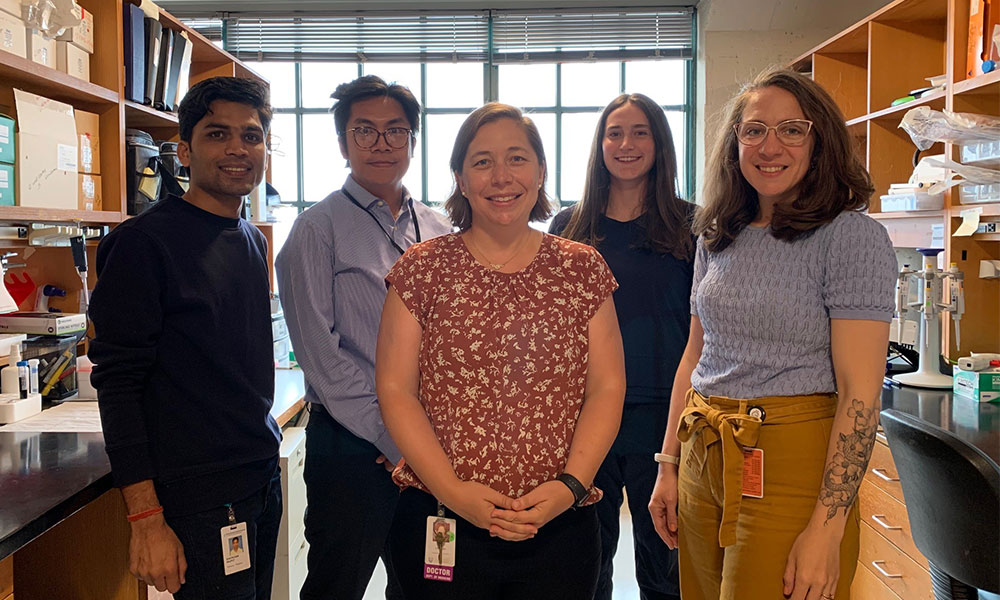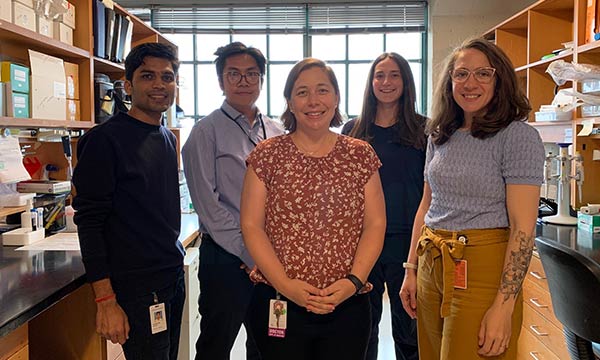Drug Developed for Inherited Bleeding Disorder Shows Promising Trial Results
A study led by Mass General Brigham researchers found that engasertib lessened bleeding events for patients with HHT, the second most common inherited bleeding disorder.
Weather AlertWe are monitoring the weather's impact on our services. If you are experiencing a medical emergency, call 911 or go to the nearest emergency department. Mass General Brigham's emergency departments remain open. For real-time updates and service changes, please check our Alerts page.View Alerts page
Contact Information
149 13th St.
Room 8.127
Charlestown,
MA
02129
Phone: 617-726-5640
Email: rknipe@mgh.harvard.edu
Repetitive injury to the lung is believed to initiate many chronic lung diseases, including pulmonary fibrosis. The lung’s ability to repair normally depends on functional cellular processes involving epithelial cells, endothelial cells, immune cells, and fibroblasts. Ineffective repair leads to persistent tissue damage and fibrotic scarring. One example of inadequate repair in patients with pulmonary fibrosis is the failure of type 2 alveolar epithelial cells (AEC) to differentiate into type 1 AECs.
The Knipe Laboratory at Massachusetts General Hospital, led by Rachel Knipe, MD, is interested in understanding the mechanisms that lead to ineffective repair and fibrosis, focusing on the role of endothelial dysfunction in this process. We believe that persistent endothelial dysfunction activates fibroblasts and prevents epithelial regeneration after injury, thereby tipping the balance in the lung toward fibrosis rather than repair. We are interested in idiopathic pulmonary fibrosis (IPF) and fibrosis that occurs in the context of systemic diseases, such as connective tissue disease (CTD), and after viral infections, such as influenza or COVID-19 infections.
Endothelial cells are important for many tissue functions, with one primary role being modulating vascular permeability. The Knipe laboratory is interested in signaling pathways that regulate vascular permeability, including Rho kinase (ROCK) and sphingosine-1-phosphate (S1P). Both pathways induce significant cytoskeletal changes that influence endothelial barrier function. In addition, they mediate downstream signaling that controls migration, proliferation, and survival. The Knipe Lab has shown vital links between these signaling pathways and fibrotic outcomes in both bleomycin- and influenza-induced animal models of pulmonary fibrosis.
View Knipe Laboratory publications
Rachel Knipe, MD, is supported by a Career Development Award from the NIH NHLBI (K08), awarded in 2018, and an NIH NHLBI R03, awarded in 2022. In 2021, she received the Eleanor Shore Fellowship Award from Harvard Medical School and Mass General Department of Medicine, and a Boehringer Ingelheim Discovery ILD Award. In 2022, she received the Jo Rae Wright Award from the American Thoracic Society Respiratory Cell and Molecular Biology Assembly.
We are always looking for postdoctoral fellows interested in research at the interface of vascular biology and pulmonary fibrosis. Interested applicants should email Dr. Rachel Knipe with their detailed curriculum vitae and a cover letter describing relevant training and research experience.
A study led by Mass General Brigham researchers found that engasertib lessened bleeding events for patients with HHT, the second most common inherited bleeding disorder.
Browse through book suggestions and additional resources for children and teens who are grieving.
Find reading recommendations for families on how to understand and navigate when someone they care about is seriously ill.
Personal journal writing is described as a tool for self-reflection and growth during bereavement. Learn how to show up for your feelings using these ideas and journal prompts.
Find a checklist of tasks after a death: a list of people to notify, places to contact after the death of a loved one, and other resources through the Division of Palliative Care & Geriatrics at Massachusetts General Hospital.
Find resources tailored to grieving adults such as books on general loss, loss of a spouse or partner, loss of a parent and sibling, and more.

